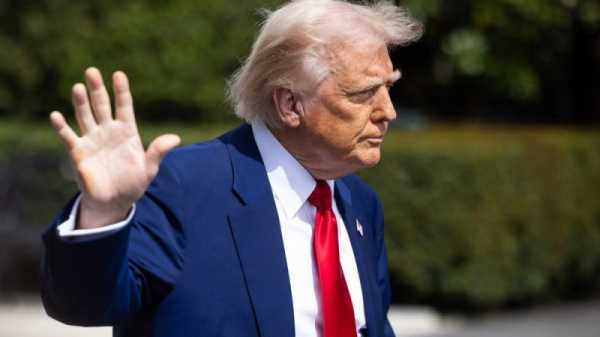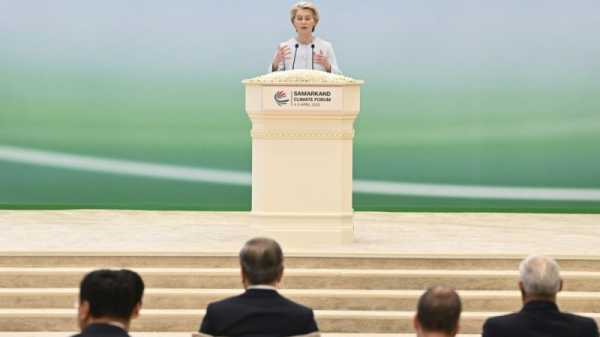
As European political parties kick off their campaigns for next year’s EU elections, progressive candidates should appeal to small donors, Ari Rabin-Havt, Bernie Sanders’ deputy campaign manager for the 2020 US presidential race, told EURACTIV in an exclusive interview.
Ahead of the European elections – set to take place between 6 and 9 June next year – Rabin-Havt argued that progressive political forces should look at small donor fundraising, rather than major financiers, in order to reconnect with their supporters.
The fundraising strategy, which was used by the US Democratic candidate Bernie Sanders in the 2020 presidential race, could be a powerful tool in effectively countering the rise of right and far-right parties, the campaign manager said.
Sanders’ experiment
Instead of relying on large donors, Sanders called on voters to support him through small donations, ultimately totalling $96 million in 2019 without holding high-dollar fundraising events. He received donations from around 1.4 million people, the highest number among candidates.
“At some point, somebody is going to adopt this strategy in Europe and it is going to work,” Rabin-Havt said.
However, progressives across Europe need to make sure they are the first ones to do so, said the former advisor, who presented his fundraising strategy to representatives of the Socialists, Liberals, Greens, The Left, and Volt in Brussels at the end of May.
“I would like to make sure that the [parties in the progressive political spectrum] adopt that before the right, because it will be a powerful tool for whoever succeeds,” pointing to the role that the strategy can play to support candidates both financially and politically.

Talking about the EU elections
What policies will be at the heart of their electoral campaigns? Are they going to have a Spitzenkandidat? How will groups differentiate from each other? These are among the questions EURACTIV asked presidents of the political groups in the European …
Connecting with supporters
According to Rabin-Havt, small donor fundraising gives “supporters a way of directly connecting with the campaign”.
In his view, this could also help European progressive parties regain the electorate’s trust following Qatargate, the EU corruption scandal that engulfed EU institutions last December, implicating top EU politicians from the Socialists party.

'No registration, no access', MEPs tell interest groups
Lobbyists and NGOs must be registered on the EU’s transparency register, before they can participate as invited guests or co-host events in the European Parliament, according to a decision adopted by the Parliament’s leadership earlier this week.
“This is fundamentally about reconnecting your politics to the people and when you do that, it builds trust and lessens the gap between politicians and the average person,” he said, adding that this is done by giving a voter more regular engagement in a given politician’s campaign.
“With small donations, I can give you $25, and then $25 again and again and I can keep coming back,” Rabin-Havt explained. “The average person giving to Bernie [Sanders] did not donate once, they gave multiple times over and over and over again.”
European and national parties
Both EU and national parties could be involved in such a method of fundraising and many European national parties already have an online platform to receive small donations from supporters.
Currently, three-quarters of the funding for European political parties comes directly from the European Parliament, with the remaining quarter coming from memberships of national parties and donations.
According to EU rules, European political parties can accept donations as long as they are not anonymous and do not exceed €18,000 per donor per year.
Each donation must be reported in the parties’ annual financial statements. In the six months preceding the elections, they must also be reported to the Authority for European political parties on a weekly basis.
Limitations
Parallels between the political cultures of the US and the EU suggest that small-donor fundraising could work well in the European context, according to Rabin-Havt.
However, differences in the use of personal data could form one of the main limitations of using the strategy in the EU.
“I think the bigger block is often GDPR (General Data Protection Regulation) rules and how that impacts how data is handled,” he said.
While the US has more relaxed data privacy laws, the EU strictly regulates the use of personal data. This means that donors, for instance, cannot be contacted again unless they agreed to have their data used accordingly.
In the context of online-based fundraising, according to the former advisor, this could represent a huge limitation when political parties try to reach out to previous supporters to encourage them to donate again.
Countering the right
Regardless, Rabin-Havt said the strategy could still help progressives counter the rise of right and far-right parties, which have gained popularity across many EU member states in the last years.
Another priority for progressive forces in the run-up to the elections will be partnerships across the Atlantic, he added.
“The links between the US right and European right-wing nationalists are very, very strong, and they’re tied together in strategy and in ideology,” he said.
In May 2022 and 2023, for instance, the US Republican party organised the Conservative Political Action Conference in Hungary, a pivotal annual event for the US right-wing parties backed by Hungarian prime minister Viktor Orbán.
Orbán and former US President Donald Trump have publicly demonstrated close ties on several occasions – ahead of the Hungarian general elections in January, Trump sent Orbán a letter of support.
“The left around the world needs to have the same global links,” Rabin-Havt concluded.

Trump praises Hungary’s Orbán in pre-election letter
Former US president Donald Trump on Monday (3 January) enthusiastically backed the reelection of Hungarian Prime Minister Viktor Orbán, a hardline hero who has been accused of creeping authoritarianism.
Additional reporting by Eleonora Vasques.
[Edited by Nathalie Weatherald/Eleonora Vasques]
Source: euractiv.com



